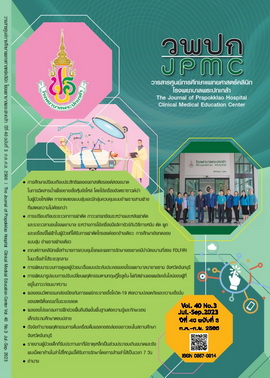Clinical Prediction Score for Disease Control and Treatment Outcomes of FOLFIRI as Second-line Chemotherapy for Metastatic Colorectal Cancer
Main Article Content
Abstract
BACKGROUND: Colorectal cancer is a leading cause of death. The standard treatment for advanced stages is chemotherapy. However patients who have received second-line chemotherapy often feel deteriorated and exhausted after first-line treatment. The disease control of chemotherapy is reduced. This study aimed to identify the predictive factors associated with disease control and predictive score to assess the efficacy of FOLFIRI chemotherapy. The results may help in optimizing treatment for metastatic colorectal cancer
OBJECTIVE: To determine prediction score for disease control to evaluate the efficacy of FOLFIRI as second-line chemotherapy for metastatic colorectal cancer
METHODS: A retrospective case-control study was conducted. Patients at Surin Hospital diagnosed with metastatic colorectal cancer were reviewed between January 1, 2013 and June 30, 2022. All patients previously received the FOLFOX regimen. Clinical characteristics, laboratory tests and treatment outcomes for all patients were collected. Exploratory analyses of the factors associated with disease control and efficacy of FOLFIRI were performed by prediction score.
RESULTS: Two hundred and nine patients with metastatic colorectal cancer at Surin Hospital were recruited and classified into 2 groups comprising 90 patients in the disease control group and 119 patients in the progression group. The predictive factors for disease control of FOLFIRI were body mass index (BMI) ≥18.5 kg/m2 (OR, 5.93; 95% CI: 2.19-16.06; p<0.001), number of metastatic sites <4 (OR, 5.44; 95% CI: 1.11-26.64; p=0.03), Hemoglobin (Hb) ≥13 g/dl (OR, 3.74; 95% CI: 1.13-12.33; p=0.03), first-line response (complete response [CR}/partial response [PR]/stable disease [SD]) (OR, 2.54; 95% CI: 1.01-6.42; p=0.04), progression-free survival (PFS) first-line >12 months (OR, 2.41; 95% CI: 1.08-5.35; p=0.03) and lymphovascular invasion (LVI) positive (OR, 2.31; 95% CI: 1.06-5.04; p=0.03). The poor prognostic group (0-2 factors), intermediate prognostic group (3-4 factors) and excellent prognostic group (5-6 factors) had progression-free survival (PFS) of 2.7 months (95%. CI, 2.10-3.33), 4.7 months (95% CI: 3.33-6.24), and 7.8 months (95% CI: 7.64-8.05), respectively. Overall survival (OS) was 17.2 months (95% CI: 15.70- 18.71), 28.6 months (95% CI: 25.01-32.20) and 33.6 months (95% CI: 26.85-40.48), respectively. PFS and OS were statistically significant different among all three groups.
CONCLUSIONS: The predictive factors for disease control of second-line FOLFIRI chemotherapy for metastatic colorectal cancer were BMI ≥18.5 kg/m2, number of metastatic sites <4, Hb ≥13 g/dl, first-line response (CR/PR/SD), PFS first-line >12 months and LVI positive. The prediction score revealed that more predictive factors could result in the optimized efficacy of chemotherapy
Article Details

This work is licensed under a Creative Commons Attribution-NonCommercial-NoDerivatives 4.0 International License.
References
Insamran W, Sangrajrang S. National Cancer Control Program of Thailand. Asian Pac J Cancer Prev 2020;21:577-582.
Meyerhardt JA, Mayer RJ. Systemic therapy for colorectal cancer. N Engl J Med 2005;352:476-87.
Tournigand C, André T, Achille E, Lledo G, Flesh M, Mery-Mignard D, et al. FOLFIRI followed by FOLFOX6 or the reverse sequence in advanced colorectal cancer: a randomized GERCOR study. J ClinOncol 2004;22:229-37.
Goldberg RM, Sargent DJ, Morton RF, Fuchs CS, Ramanathan RK, Williamson SK, et al. A randomized controlled trial of fluorouracil plus leucovorin, irinotecan, and oxaliplatin combinations in patients with previously untreated metastatic colorectal cancer. J ClinOncol 2004;22:23-30.
Sobrero A, Lenz HJ, Eng C, Scheithauer W, Middleton G, Chen W, et al. Extended RAS analysis of the phase III EPIC trial: irinotecan + cetuximab versus irinotecan as second-line treatment for patients with metastatic colorectal cancer. Oncologist [Internet]. 2021[cited 2023 Mar 5];26(2):e261-9.
Peeters M, Price TJ, Cervantes A, Sobrero AF, Ducreux M, Hotko Y, et al. Final results from a randomized phase 3 study of FOLFIRI {+/-} panitumumab for second-line treatment of metastatic colorectal cancer. Ann Oncol 2014;25:107-16.
Lee JJ, Sun W. Options for second-line treatment in metastatic colorectal cancer. Clinadvhematol oncol 2016;14:46-54.
Bidard FC, Tournigand C, André T, Mabro M, Figer A, Cervantes A, et al. Efficacy of FOLFIRI-3 (irinotecan D1,D3 combined with LV5-FU) or other irinotecan-based regimens in oxaliplatin-pretreated metastatic colorectal cancer in the GERCOR OPTIMOX1 study.AnnOncol 2009;20:1042-7.
Basade M, Mane A. Optimum patient selection for irinotecan-containing regimens in metastatic colorectal cancer: literature review and lessons from clinical practice. Indian J Cancer 2021;58:5-16.
Heinemann V, von Weikersthal LF, Decker T, Kiani A, Kaiser F, Al-Batran SE, et al. FOLFIRI plus cetuximab or bevacizumab for advanced colorectal cancer: final survival and per-protocol analysis of FIRE-3, a randomised clinical trial. Br J Cancer 2021;124:587-94.
Guarini C, Grassi T, Pezzicoli G, Porta C. Beyond RAS and BRAF: HER2, a New Actionable Oncotarget in Advanced Colorectal Cancer. Int J MolSci[Internet]. 2021[cited 2023 Mar 5];22(13):6813.
Schwartz LH, Litière S, de Vries E, Ford R, Gwyther S, Mandrekar S, et al. RECIST 1.1-Update and clarification: From the RECIST committee. Eur J Cancer 2016;62:132-7.
Abdel-Rahman O. Effect of body mass index on 5-FU-Based Chemotherapy Toxicity and Efficacy Among Patients With Metastatic Colorectal Cancer; A Pooled Analysis of 5 Randomized Trials. Clin Colorectal Cancer[Internet]. 2019[cited 2023 May 15];18(4):e385-93.
Gherman A, Balacescu L, Gheorghe-Cetean S, Vlad C, Balacescu O, Irimie A, et al. Current and new predictors for treatment response in metastatic colorectal cancer. The role of circulating miRNAs as biomarkers.Int J MolSci [Internet]2020 [cited 2023 May 15];21(6):2089. Available from: https://www.mdpi.com/1422-0067/21/6/2089.
Baxter NN, Kennedy EB, Bergsland E, Berlin J, George TJ, Gill S, et al. Adjuvant therapy for stage II colon cancer: ASCO guideline update. J ClinOncol 2022;40:892-910.

